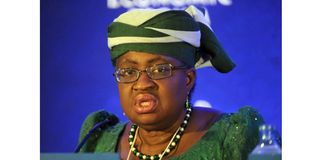Ngozi’s race shouldn’t end in glass ceiling

Nigeria's Minister of Finance Ngozi Okonjo-Iweala speaks during the World Economic Forum in Abuja on May 9, 2014.
What you need to know:
- The WTO General Council could decide to vote to select Ngozi, against the wishes of the US, but this move could yield serious global repercussions.
- Ngozi’s current predicament eerily reminds me of 2016, when we were all sure that Hillary Clinton would win the US election until we witnessed a political upset that many of us will not forget in a long time.
Ngozi Okonjo-Iweala, a former Nigerian finance minister, is on the cusp of being appointed as the World Trade Organisation Director General.
The WTO nominations committee on Wednesday recommended to the organisation’s 164 members the appointment of the former World Bank managing director as the WTO head.
Ngozi has so far made an impressive run, bagging key endorsements such the European Union, Africa, China and Japan. Most recently, she was tipped to be the favourite candidate “most likely to attract consensus support from WTO members,” according to Bloomberg. The US is the only member country that is not supporting her. Instead, the Trump administration is backing another woman, South Korea’s Yoo Myung-hee.
For an organisation that traditionally appoints the DG based on the consensus of all members, the selection process has been thrust in very murky waters, which could undo years of trade agreements and claw back on significant progress. The WTO General Council could decide to vote to select Ngozi, against the wishes of the US, but this move could yield serious global repercussions.
The other option is to simply wait out the Trump administration and hope that Joe Biden wins the US election. So, technically, Ngozi’s fate lies in the hands of US voters, never mind that she’s also a US citizen.
The WTO has planned a meeting on November 9 to deliberate on the issue, with the hope that by then they will be dealing with a different dispensation. Whether Ngozi or Yoo, it will be a win-win for women, as the winner will be the first female head of the organisation. It goes without saying that if Ngozi loses, Africa will have lost a chance of being represented at WTO at the highest levels.
It is unfortunate that these two women have been caught up in global tensions that are no fault of their own. The US, like any other WTO member has the right to pick its preferred candidate, and it does not have to be an African woman.
Their issue with Ngozi is likely because of her “internationalist” ideological stance, which may not be necessarily shared by the current administration.
That said, the current situation speaks to the unseen and unspoken dynamics that determine one’s ascent to such top jobs, factors that go beyond personal intelligence, expertise and experience.
That no matter how intelligent, well-spoken or popular one is, her stars have to align. One might lose simply because they come from the “wrong country.”
Ngozi’s current predicament eerily reminds me of 2016, when we were all sure that Hillary Clinton would win the US election until we witnessed a political upset that many of us will not forget in a long time. When Hillary lost, we asked ourselves, “Is this the ultimate glass ceiling?”
I hope Ngozi’s inspiring journey will not end in another upsetting glass ceiling for African women. Because we have had enough of glass ceilings.





